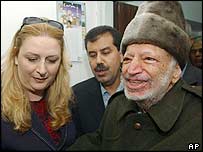
Arafat was transferred to a Paris hospital 11 days ago
|
Palestinian leader Yasser Arafat is suffering from a brain haemorrhage, a senior aide in the West Bank has said.
Mr Arafat started bleeding on Monday evening and was now in a critical condition in a Paris hospital, Tayeb Abdel Rahim told reporters in Ramallah.
In Paris, Palestinian Foreign Minister Nabil Shaath said Mr Arafat's condition had deteriorated but that "euthanasia" was not an option.
Palestinian Prime Minister Ahmed Qurei earlier visited Mr Arafat's bedside.
A Palestinian delegation spent two hours at the Percy military hospital but only Mr Qurei was able to visit the gravely ill 75-year-old, who fell into a deeper coma overnight.
 |
 I cannot help but have sympathy for a man who has suffered alongside his people for many years
I cannot help but have sympathy for a man who has suffered alongside his people for many years

|
Mr Shaath later told a news conference that the Palestinian leadership wanted to end speculation about Mr Arafat's condition.
"His brain, his heart and his lungs are still functioning and he is alive," Mr Shaath said.
"I don't see any reason to make rumours precipitating his death."
Mr Arafat had been in a coma since last Wednesday and his health was "in the hands of God", Mr Shaath said.
He added that he wanted to "rule out any question of euthanasia" to prematurely bring the veteran Palestinian leader's life to an end.
"People talk as if his life can be plugged in or plugged out.
This is ridiculous. We Muslims do not allow euthanasia."
"He will live or die depending on his body's ability to resist
and on the will of God."
Diagnosis unclear
In Ramallah, Mr Arafat's top aide, Tayeb Abdel Rahim called on the Palestinian people to pray for their leader.
Beside him, the Palestinian chief negotiator, Saeb Erekat, with tears in his eyes, said that if the worst happened, all arrangements would be made at Mr Arafat's compound in Ramallah.
Mr Arafat was taken to France 11 days ago, leaving his battered headquarters for the first time in nearly three years. He had been suffering mystery stomach pains.
Doctors have confirmed that Mr Arafat's coma has deepened. However, the reasons for his illness are still not clear.
Mr Shaath said doctors have ruled out cancer and poisoning. He added that Mr Arafat's long confinement in Ramallah by Israeli forces had contributed to his poor health.
Mr Qurei is heading the Palestinian delegation which arrived in Paris on Monday night and planned to return to Ramallah later on Tuesday.
The delegation included former Palestinian Prime Minister Mahmoud Abbas and the speaker of the Palestinian Legislative Assembly, Rawhi Fattuh - who will become the interim president of the Palestinian Authority if Mr Arafat dies.
The visit to Paris followed a public row with Mr Arafat's wife Suha, who has been controlling access to her husband.
On Monday, Mrs Arafat accused the leaders of conspiring against her husband, telling
the Arabic TV station al-Jazeera they were trying "to bury Arafat while he is still alive".
There has been much confusion about Mr Arafat's condition.
Last week Israeli television reported that he was dead. Other reports, rejected by Mrs Arafat, have suggested he is brain dead.